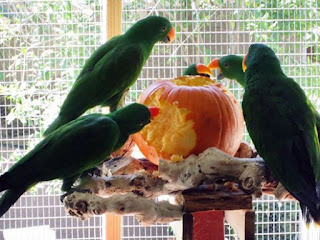Vitamin A deficiency Information [Parrot Health]
Vitamin A is a fat-soluble vitamin that helps grow and repair tissue. This antioxidant also helps to function eyes, skin, hearing, bone, and membranes.
Lack of Vitamin A causes bacteria, fungal, and virus infection because vitamin A is needed to produce mucous which is a layer of protection against the pathogen. So if your parrot has a vitamin A deficiency, it will not produce mucous, which will cause reoccurring infections.
Vitamin A deficiency in birds is a direct cause of inadequate diet. Only seeds diet, no fresh food, causes vitamin A deficiency in parrots because seeds don't contain vitamin A. Even when seeds are enriched with vitamins, the parrots eat the seed inside the shell, not the whole shell. Most vitamins add in seeds, only sit on top of the shell, and aren't consumed.

Why is Vitamin A deficiency an issue with parrots?
Because parrots require as much Vitamin A as humans, daily. Humans daily allowance for vitamin A is 2400 to 5000 IE a day; for parrots 2000-4000 IE per kg body weight. Therefore, per kg of a parrot, a parrot requires as much vitamin A as a human.
Signs and symptoms of vitamin A deficiency:

Treatment of Vitamin A Deficiency
Treatment of Vitamin A deficiency relies on the severity of the infection caused by the vitamin A deficiency.
Your vet will perform CBC and cultures to get a better understanding of the case. From the cultures, a specific antibiotic medicine can be given. The first step is to deal with the secondary infection because the infection causes death, and damage to internal organs. After an injection of vitamins can help boost vitamin A.
In some cases nostrils must be physically unplugged, then nasal flush with antibodies. Surgical lancing of abscesses might also be needed.
Prevention of Vitamin A Deficiency
No, not supplements. An adequate diet. Supplements can do more harm than good. The best way to ensure your parrot's well-being is by providing fresh food daily. There are many fresh foods with high amounts of Vitamin A.
Here is a list of parrot safe food which are high in Vitamin A.
Over Supplement of Vitamin A (Hypervitaminosis A)
Reference:
__________
Monika Sangar, MSc – Molecular Biology | Avian Nutrition Specialist | Founder: PDSnonprofit | Owner: Pds Parrot Shop
Monika Sangar holds a Master of Science in Molecular Biology and is a dedicated Avian Nutrition Specialist with over 14 years of hands-on experience rescuing and rehabilitating parrots. As the founder of PDSnonprofit and Owner of PDS Parrot Shop, she combines scientific knowledge with practical expertise to create enrichment-focused bird toys and species-appropriate diets. Her work emphasizes evidence-based care, behavioral enrichment, and long-term wellness for companion parrots. She is also an author who wrote, The Science of Avian Nutrition: https://a.co/d/f14lNl3
PDS is a registered 501(c)(3) nonprofit organization (tax id #46-2470926)


